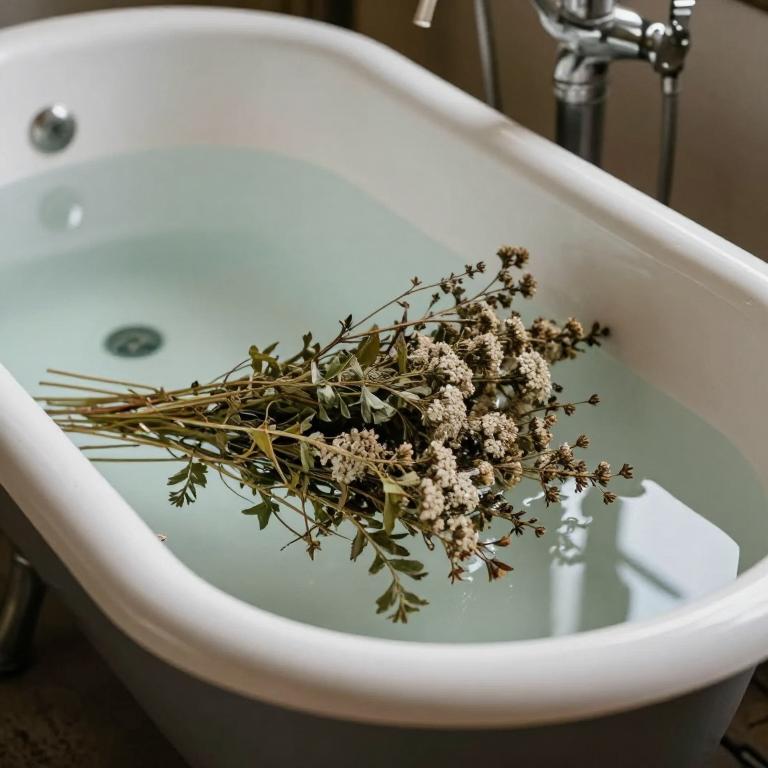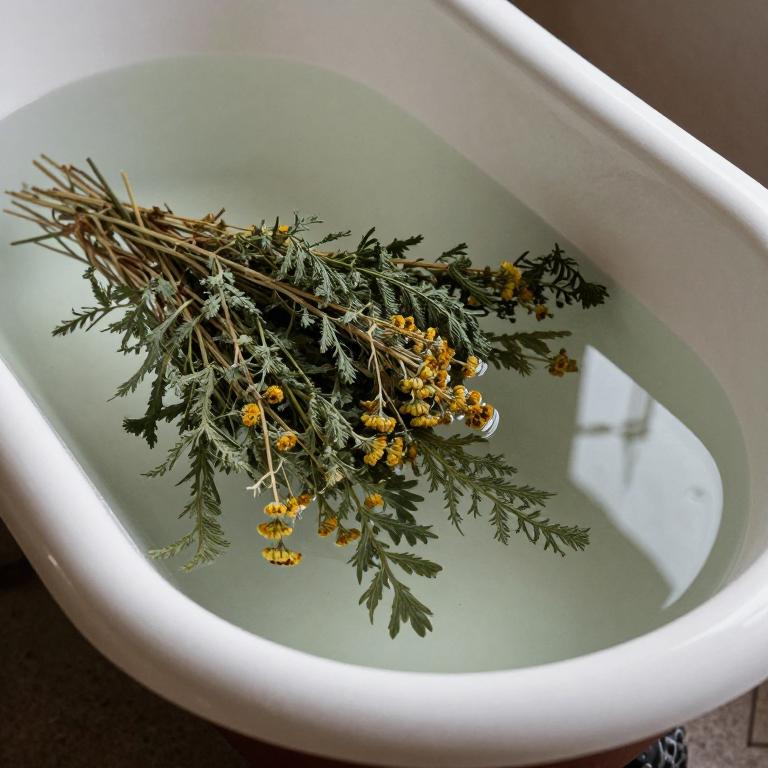10 Best Herbal Baths For Ringworm

Herbal baths can be an effective natural remedy for treating ringworm by leveraging the antifungal and soothing properties of certain herbs.
Common herbs used in these baths include lavender, tea tree oil, oregano, and garlic, which are known for their ability to combat fungal infections. To prepare an herbal bath, simply add a few drops of essential oils or a handful of dried herbs to warm water and soak for at least 15 minutes. This method helps to reduce inflammation, kill fungi, and promote healing of the affected skin.
While herbal baths can provide relief, they should be used in conjunction with other treatments and under the guidance of a healthcare professional for optimal results.
Table of Contents
- 1. English lavender (Lavandula angustifolia)
- 2. St. john's wort (Hypericum perforatum)
- 3. Thyme (Thymus vulgaris)
- 4. Polium germander (Teucrium polium)
- 5. Stinging nettle (Urtica dioica)
- 6. Rosemary (Rosmarinus officinalis)
- 7. Yarrow (Achillea millefolium)
- 8. Wormwood (Artemisia vulgaris)
- 9. Field horsetail (Equisetum arvense)
- 10. German chamomile (Chamomilla recutita)
1. English lavender (Lavandula angustifolia)

Lavandula angustifolia, commonly known as English lavender, has been traditionally used for its antifungal and soothing properties, making it a valuable ingredient in herbal baths for treating ringworm.
When infused into bath water, lavender essential oils can help reduce the fungal infection by creating an environment that inhibits the growth of dermatophytes, the fungi responsible for ringworm. The aromatic compounds in lavender also provide a calming effect, which can ease the discomfort and itching associated with the condition. To prepare a lavender bath, simply steep dried lavender flowers in hot water for several hours, then add the infusion to warm bath water for a 15-20 minute soak.
While lavender baths can be a natural and complementary treatment, they should be used alongside medical advice and prescribed antifungal treatments for optimal results.
2. St. john's wort (Hypericum perforatum)

Hypericum perforatum, also known as St. John's Wort, has been traditionally used in herbal baths for its potential antifungal and anti-inflammatory properties.
When infused into bathwater, it may help alleviate the symptoms of ringworm by reducing skin irritation and promoting healing. The active compounds in St. John's Wort, such as hypericin and hyperforin, are believed to have antimicrobial effects that may inhibit the growth of fungi responsible for ringworm. However, it is important to note that while some anecdotal evidence supports its use, scientific research on its efficacy for fungal infections is limited.
As with any herbal remedy, it is advisable to consult a healthcare professional before using St. John's Wort baths, especially if you are on medication or have sensitive skin.
3. Thyme (Thymus vulgaris)

Thymus vulgaris, commonly known as thyme, has been traditionally used in herbal baths for its antifungal and antimicrobial properties, making it a potential natural remedy for treating ringworm.
When infused into bath water, thyme essential oil or dried thyme can help soothe the skin and reduce the fungal infection caused by dermatophytes. The aromatic compounds in thyme, such as thymol, have been shown to inhibit the growth of fungi, aiding in the healing process. To use thyme in a bath, it is recommended to steep a few tablespoons of dried thyme in hot water for several minutes before adding it to a warm bath.
While thyme baths may offer some relief, they should not replace medical treatment for severe or persistent ringworm infections.
4. Polium germander (Teucrium polium)

Teucrium polium, commonly known as boldo, has been traditionally used in herbal remedies for its antifungal and anti-inflammatory properties.
When used in baths, it can help soothe the skin and reduce the symptoms of ringworm by creating an environment less favorable for fungal growth. To prepare the bath, a handful of dried Teucrium polium leaves is boiled in water and then allowed to cool before being added to a tub. The antifungal compounds in the herb may inhibit the spread of the ringworm infection and promote healing.
However, it is important to consult with a healthcare provider before using herbal baths, especially for those with sensitive skin or existing medical conditions.
5. Stinging nettle (Urtica dioica)

Urtica dioica, commonly known as stinging nettle, has been traditionally used in herbal baths to treat skin conditions like ringworm due to its anti-inflammatory and antifungal properties.
When prepared as a bath, the leaves of stinging nettle can be steeped in hot water to create a soothing infusion that helps reduce itching and redness associated with ringworm. The high concentration of silica and antioxidants in nettle may support skin healing and strengthen the skin's natural defenses against fungal infections. However, it is important to ensure the nettle is properly harvested and prepared to avoid irritation from its stinging hairs.
While some people find relief using nettle baths, they should not replace medical treatments and should be used in conjunction with professional advice for effective management of ringworm.
6. Rosemary (Rosmarinus officinalis)

Rosmarinus officinalis, commonly known as rosemary, is a fragrant herb that has been traditionally used for its therapeutic properties, including its potential benefits in treating ringworm.
When infused into a bath, rosemary can help soothe the skin and may have antifungal properties that support the healing process of fungal infections like ringworm. The essential oils in rosemary, such as camphor and cineole, are believed to have antimicrobial effects that can inhibit the growth of fungi. To use rosemary in a herbal bath, simply steep fresh or dried rosemary leaves in hot water and allow the solution to cool before adding it to a warm bath.
While rosemary baths can be a complementary remedy, they should not replace professional medical treatment for ringworm, and it is advisable to consult a healthcare provider for proper diagnosis and care.
7. Yarrow (Achillea millefolium)

Achillea millefolium, commonly known as yarrow, has been traditionally used in herbal remedies for its antifungal and anti-inflammatory properties.
When used in a bath, yarrow can help soothe the skin and potentially reduce the symptoms of ringworm by creating an environment less favorable for fungal growth. To prepare an herbal bath, steep a handful of dried yarrow leaves in hot water for several minutes, then add the infused water to a tub of warm water. Soaking in this bath for 15 to 20 minutes may help alleviate itching and redness associated with ringworm.
While yarrow baths can be a complementary treatment, they should not replace medical advice, and it is important to consult a healthcare professional for persistent or severe infections.
8. Wormwood (Artemisia vulgaris)

Artemisia vulgaris, also known as common wormwood, has been traditionally used in herbal baths to treat skin conditions such as ringworm due to its antimicrobial and antifungal properties.
When infused into warm water, the essential oils and compounds in artemisia can help reduce fungal growth and soothe irritated skin affected by ringworm. To prepare the bath, a handful of dried artemisia leaves is boiled in water, then cooled to a comfortable temperature before being used for soaking. Regular use of this herbal bath may help alleviate symptoms and promote healing, though it should be used in conjunction with other treatments recommended by a healthcare provider.
While generally safe, some individuals may experience allergic reactions, so a patch test is advisable before full use.
9. Field horsetail (Equisetum arvense)

Equisetum arvense, commonly known as field horsetail, has been traditionally used in herbal baths for the treatment of ringworm due to its high concentration of silica and antimicrobial properties.
The silica in horsetail helps to strengthen skin tissue and promote healing, while its natural antifungal compounds may inhibit the growth of dermatophyte fungi that cause ringworm. To prepare an herbal bath, fresh or dried horsetail can be boiled and used to soak the affected area, or added to a warm water bath for a soothing effect. This method is often preferred for its gentle, natural approach and minimal side effects compared to synthetic antifungal treatments.
While horsetail baths may provide symptomatic relief, they should be used in conjunction with other medical treatments for optimal results.
10. German chamomile (Chamomilla recutita)

Chamomilla recutita, commonly known as German chamomile, has been traditionally used in herbal baths for its soothing and antifungal properties.
When infused into warm water, chamomile baths can help alleviate the itching and redness associated with ringworm by reducing inflammation and promoting skin healing. The essential oils in chamomile, such as bisabolol and chamazulene, possess natural antifungal and antimicrobial effects that may inhibit the growth of the fungus causing ringworm. To prepare a chamomile bath, steep a handful of dried chamomile flowers in boiling water for 10-15 minutes, then strain and use the liquid to fill a warm bath.
While chamomile baths can be a complementary therapy, they should not replace medical treatment for severe or persistent ringworm infections.